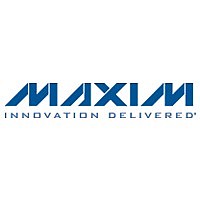DS3184DK Maxim Integrated Products, DS3184DK Datasheet - Page 76

DS3184DK
Manufacturer Part Number
DS3184DK
Description
KIT DEMO FOR DS3184
Manufacturer
Maxim Integrated Products
Datasheet
1.DS3184DK.pdf
(400 pages)
Specifications of DS3184DK
Main Purpose
Telecom, ATM / Packet PHYs
Utilized Ic / Part
DS3184
Lead Free Status / RoHS Status
Lead free / RoHS Compliant
Secondary Attributes
-
Embedded
-
Primary Attributes
-
Lead Free Status / Rohs Status
Lead free / RoHS Compliant
- Current page: 76 of 400
- Download datasheet (4Mb)
Figure 8-26
the ATM device places address ‘00h’ on the address bus (which is mapped to Port 1). PHY device '1' (Port 1)
indicates to the ATM device that it has a complete cell to send by asserting RDXA[1]. On clock edge 4, the ATM
device selects PHY device '1'. On clock edge 5, the ATM device asserts REN. On clock edge 6, the PHY device ‘1’
starts a cell transfer to the ATM device by placing the first byte of cell data on RDATA, and asserting RSOX to
indicate the transfer of the first byte of the cell. On clock edge 7, the PHY device deasserts RSOX as it continues to
place additional bytes of the cell on RDATA. On clock edge 13, PHY device ‘2’ asserts RDXA[2] to indicate to the
ATM device that it is ready to send a cell. On clock edge 15, PHY device '1’ indicates that it cannot transfer a
complete cell by deasserting RDXA[1]. On clock edge 16, the ATM device deselects PHY device '1' and selects
PHY device '2' by deasserting REN and placing PHY device '2's address on RADR. On clock edge 17, the ATM
device asserts REN. On clock edge 18, PHY device ‘2’ (Port 2) starts the transfer of a cell to the ATM device by
placing the first byte of cell data on RDATA, and asserting RSOX to indicate the transfer of the first byte of the cell.
On clock edge 18, the PHY device deasserts RSOX as it continues to place additional bytes of the cell on RDATA.
Figure 8-26. UTOPIA Level 2 Receive Cell Transfer Direct Mode
Figure 8-27
the ATM device polls PHY device 'N'. On clock edge 3, PHY device 'N' indicates to the ATM device that it can
accept cell data by asserting TPXA. On clock edge 4, the ATM device selects PHY device 'N'. On clock edge 5, the
ATM device starts a cell transfer to PHY device 'N' by asserting TEN, placing the first byte of cell data on TDATA,
and asserting TSOX to indicate the transfer of the first byte of the cell. On clock edge 6, the ATM device deasserts
TSOX as it continues to place additional bytes of the cell on TDATA. On clock edge 6, the ATM device also polls
PHY device 'O'. On clock edge 7, PHY device 'O' indicates that it can accept the transfer of a complete cell. On
clock edge 14, the ATM device polls PHY device 'N'. On clock edge 15, PHY device 'N' indicates that it cannot
accept the transfer of a complete cell. On clock edge 16, the ATM device deselects PHY device 'N' and selects
PHY device 'O' by deasserting TEN and placing PHY device 'O's address on TADR. On clock edge 17, the ATM
device starts the transfer of a cell to PHY device 'O' by asserting TEN, placing the first byte of cell data on TDATA,
and asserting TSOX to indicate the transfer of the first byte of the cell. On clock edge 18, the ATM device
deasserts TSOX as it continues to place additional bytes of the cell on TDATA.
RDXA[2]
RDXA[1]
RDXA[3]
RDXA[4]
RDATA
RSCLK
Cell From:
RADR
Transfer
RSOX
REN
shows a multidevice transmit-interface multiple cell transfer to different PHY devices. On clock edge 2,
shows a multidevice transmit-interface multiple cell transfer to different PHY devices. On clock edge 2,
1
2
3
4
5
6
H1
7
H2
…
8
00h
H3
9
76
10
P42
11
PORT 1
P43
12
P44
13
P45
14
P46
15
P47
16
P48
17
01h
18
H1
PORT 2
19
H2
20
H3
Related parts for DS3184DK
Image
Part Number
Description
Manufacturer
Datasheet
Request
R

Part Number:
Description:
IC QUAD ATM/PACKET PHY 400-PBGA
Manufacturer:
Maxim Integrated Products

Part Number:
Description:
IC PACKET PHY W/LIU 400-CSBGA
Manufacturer:
Maxim Integrated Products

Part Number:
Description:
MAX7528KCWPMaxim Integrated Products [CMOS Dual 8-Bit Buffered Multiplying DACs]
Manufacturer:
Maxim Integrated Products
Datasheet:

Part Number:
Description:
Single +5V, fully integrated, 1.25Gbps laser diode driver.
Manufacturer:
Maxim Integrated Products
Datasheet:

Part Number:
Description:
Single +5V, fully integrated, 155Mbps laser diode driver.
Manufacturer:
Maxim Integrated Products
Datasheet:

Part Number:
Description:
VRD11/VRD10, K8 Rev F 2/3/4-Phase PWM Controllers with Integrated Dual MOSFET Drivers
Manufacturer:
Maxim Integrated Products
Datasheet:

Part Number:
Description:
Highly Integrated Level 2 SMBus Battery Chargers
Manufacturer:
Maxim Integrated Products
Datasheet:

Part Number:
Description:
Current Monitor and Accumulator with Integrated Sense Resistor; ; Temperature Range: -40°C to +85°C
Manufacturer:
Maxim Integrated Products

Part Number:
Description:
TSSOP 14/A°/RS-485 Transceivers with Integrated 100O/120O Termination Resis
Manufacturer:
Maxim Integrated Products

Part Number:
Description:
TSSOP 14/A°/RS-485 Transceivers with Integrated 100O/120O Termination Resis
Manufacturer:
Maxim Integrated Products

Part Number:
Description:
QFN 16/A°/AC-DC and DC-DC Peak-Current-Mode Converters with Integrated Step
Manufacturer:
Maxim Integrated Products

Part Number:
Description:
TDFN/A/65V, 1A, 600KHZ, SYNCHRONOUS STEP-DOWN REGULATOR WITH INTEGRATED SWI
Manufacturer:
Maxim Integrated Products

Part Number:
Description:
Integrated Temperature Controller f
Manufacturer:
Maxim Integrated Products

Part Number:
Description:
SOT23-6/I°/45MHz to 650MHz, Integrated IF VCOs with Differential Output
Manufacturer:
Maxim Integrated Products

Part Number:
Description:
SOT23-6/I°/45MHz to 650MHz, Integrated IF VCOs with Differential Output
Manufacturer:
Maxim Integrated Products










